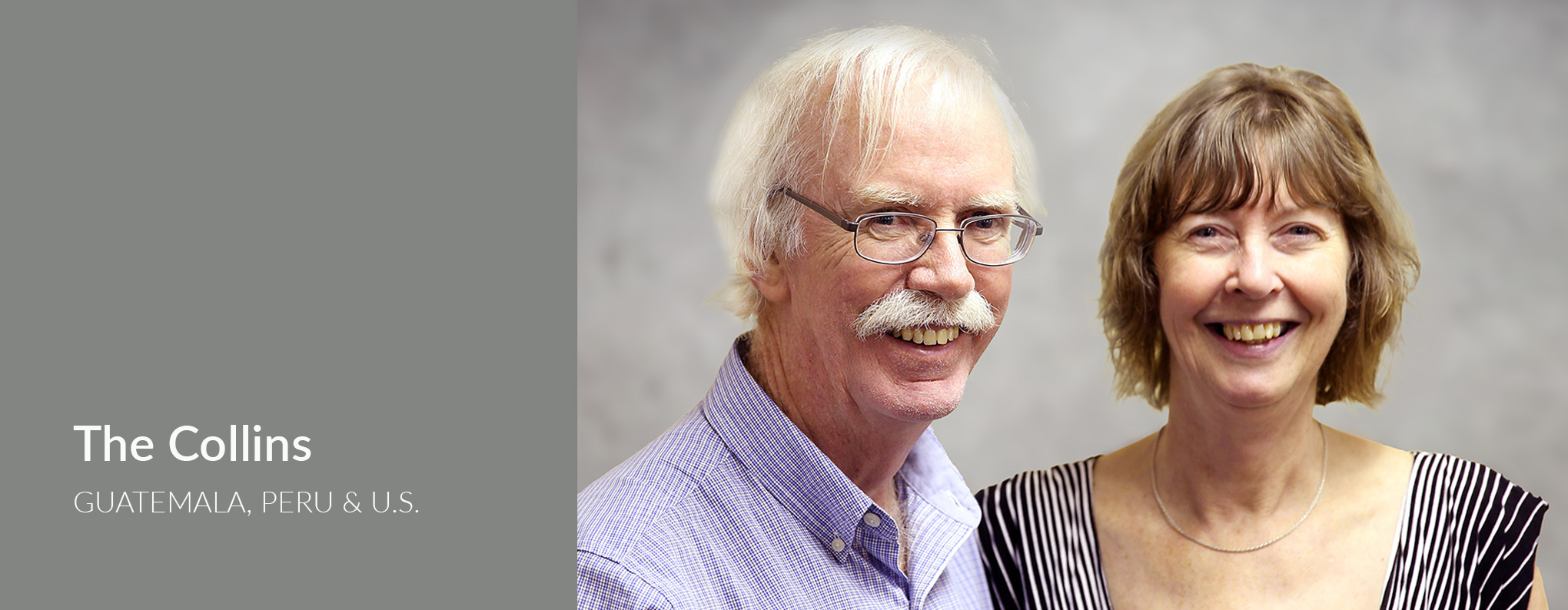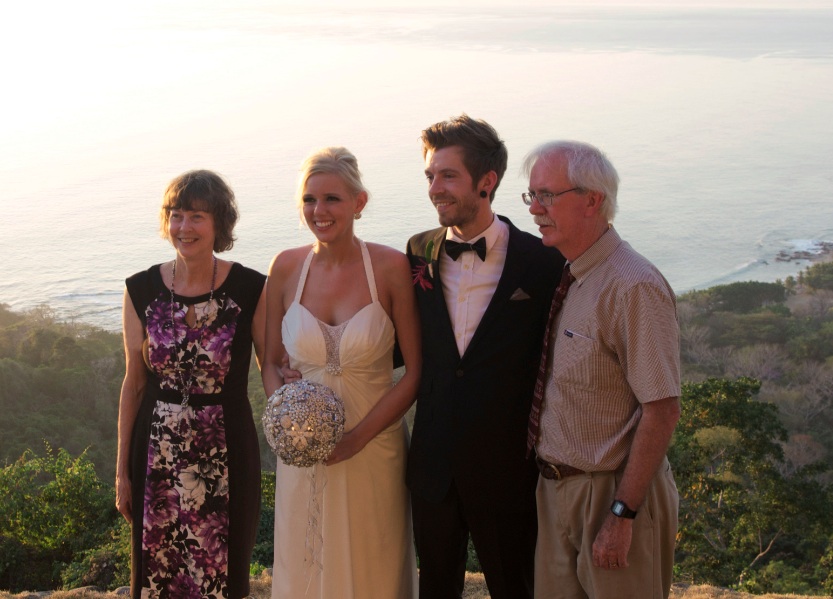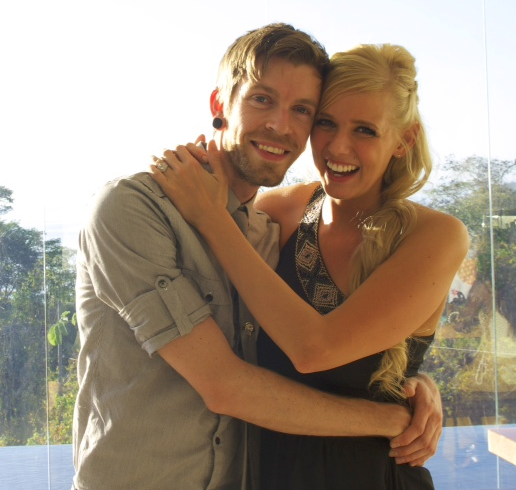
The Collins Family
Collins Family March/April 2014 Update
Dear Ones,
Greetings to you all from North Carolina. It has been a busy time for us. Nan and I and our three children (and two of our four grandchildren) all converged on a small beach town in Costa Rica for Isaac and Elizabeth's wedding on February 21. Planning a destination wedding is a bit of a shot in the dark, not having been to the site where the event would take place, but things worked admirably.
We all met up at the right time at the right spot and the wedding was beautiful. The ceremony was in the late afternoon as the sun was descending and howler monkeys ranted their approval from the trees. We overlooked miles of the Pacific beach, and soon after the declaration of man and wife, the sun slipped beneath the horizon. It was idyllic. I'm attaching a couple of pictures.
From there, Nan came "home" to North Carolina and I immediately ventured off to Dallas for a week of meetings aimed at improving and funding our training programs in Latin America. One of the outcomes of that meeting was a plan to visit Venezuela to discuss a number of new ideas with local leaders. That trip starts tomorrow, so this is still hot news.
In a nutshell, this is the plan. It used to be that when we offered training to indigenous people, we felt we had a good idea what they needed. The basic idea was "build it and they will come." If they are going to work in Bible translation and literacy, they need to be able to read their own language well. They need to understand how their language works and how meaning flows from one language to another. If they will be producing materials, they need to learn computer skills to handle formatting and publication. Students came and they got a lot of help. There are tons of things that we have jammed into the training which normally lasts 16 weeks. That's not much classroom time, and it shoots by quickly. We've done this five times and we've had around 100 indigenous students.
We'd hold these sessions where we thought there would be the best chance of training the most and the best candidates. We'd send word out and start processing applications. We have tended to get applications from all kinds of people, some who barely speak Spanish (which is necessary, since it is the language of instruction), while others speak Spanish well, but they have lived out of their home villages for so long that they barely speak their "native" language. Others have gone to high school out of the village and are looking for work and think that some good linguistic training might help them land a plum job somewhere. Some have been deeply involved already in working in literacy and translation (these make up our core target group), while others were new to the whole idea of language as a part of culture within the larger geo-political issue of multilingual nations and the importance of language maintenance and promotion.
So some of these people were good candidates and others were less so, but if they qualified (which wasn't too hard to do), we'd invite them to join us. A recurring theme was that it was hit or miss whether these students were integrally involved in their communities-or backed by the community--or not. So some of the students went back home after training and got deeply involved in local programs. Many wrote booklets in their language and posted them to the web. Others have led workshops and been extremely active. Others have just sort of floundered, with little or no opportunity to make progress.
Since we provided room and board for students over the span of four months, it got pretty expensive. We have had to figure out how to lower costs significantly, along with targeting the training to people who were really going to use it. So we're trying to solve these problems.
We're hoping that our Venezuelan CILTA grads (these are the Latino students that study with us at Ricardo Palma university in Peru) will be able to work together with indigenous people from their own country to help support the work and give on-going training, while learning the local language and developing translation skills. We also are not sending invitations to study to just anyone who sends us an address. Rather, we are working with local leaders from the church and the community in order to build support for our student applicants so they go back to SOMETHING in their home villages, at the very least, to a leadership group that cares about the future of their language.
So the upcoming Venezuela meetings are not with potential students, but with village leaders throughout Amazonas, Venezuela's southernmost region, for which Puerto Ayacucho, is the major town. That's where we'll be. We plan to meet with leaders from as many as 12 indigenous groups and help them lay out a plan for language use and maintenance, if they want to move in that direction. We think that they will want to work for the good of their languages and cultures, but it's up to them.
The idea is to plumb the depths of the interest that the leaders have in language-related work and ministry. What do the leaders want for their kids? Do they want them to join the modern world, learn to speak Spanish, and leave their legacy language behind? Or are they in favor of bilingualism--harnessing the power of Spaish without neglecting the comfort and understanding of their native langauge? Do they want their language written--or do they consider it depressing that in the US 300,000 new book titles are published every year, while in their language the entire inventory of published materials may include a Dick-and-Jane primer, a small dictionary, some Bible portions and a treatise on the treatment of diarrhea? Under such a reality and the pervasiveness of Spanish (and English) is it worth the effort to keep their language going?
Maybe not even you are convinced that this is worth doing. Just teach them Spanish and get it over with!
But what is lost when a language is lost? Our language is not just a way to communicate, it is a statement of our identity and our groundedness. It reflects our culture and the way we think about the world. Language points the way home. And these kinds of deep issues are the bread and butter of real Christianity and who we are as image-bearers of God, at home in Him. We simply cannot blow off the people who speak minority languages. They deserve a voice.
Proverbs 31:8-9 says: Speak out on behalf of the voiceless, and for the rights of all who are vulnerable. Speak out in order to judge with righteousness and to defend the needy and the poor. (Common English Bible)
So the plan is to see what these community leaders say and what they want and to see if maybe we can help them. I'll keep you posted. We're excited about this change in emphasis--from individual students to entire communities.
I plan to get back at the end of the month. Then in May we will both head off to Lima for the next CILTA training. One of the positives at CILTA is that we have named a Latino director, after having gringo directors for ten plus years. So I still get to teach, but without the administrative load. This is welcome news and a potentially giant step forward. Pray for Francisco, our new director from El Salvador.
I continue to work on my book about Mam language and culture. We're starting to talk details like pricing, the cover, and the nuts and bolts of the final draft, so it feels like we're getting close. My editor and I have now surpassed 300 e-mail exchanges filled with questions, comments and suggestions.
Nan and I have battled with the flu, and I think we're past the worst of it. May it be so.
Thanks to all of you who care about us and our work.
God's best to each one,
Wes, and for Nancy


